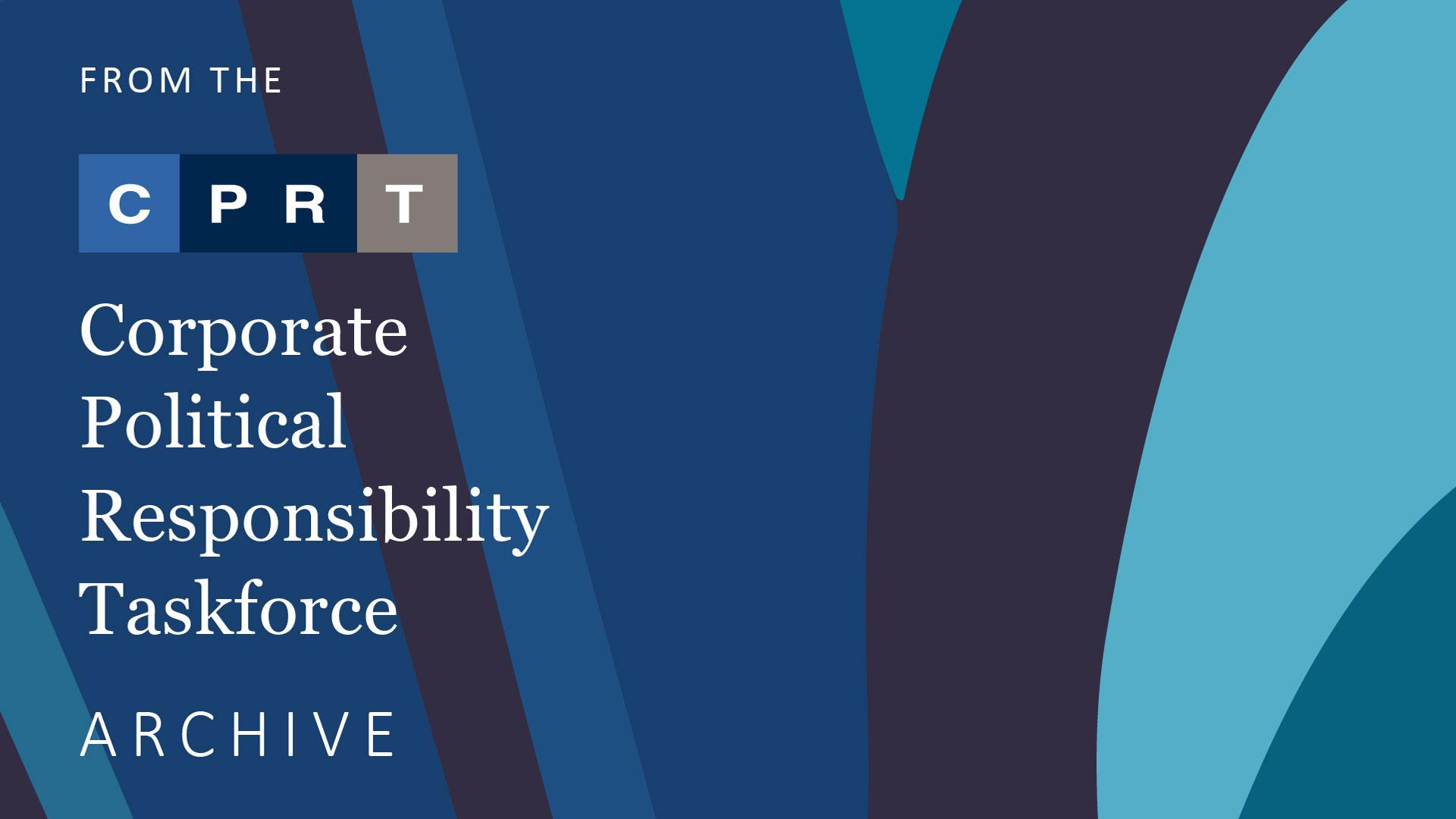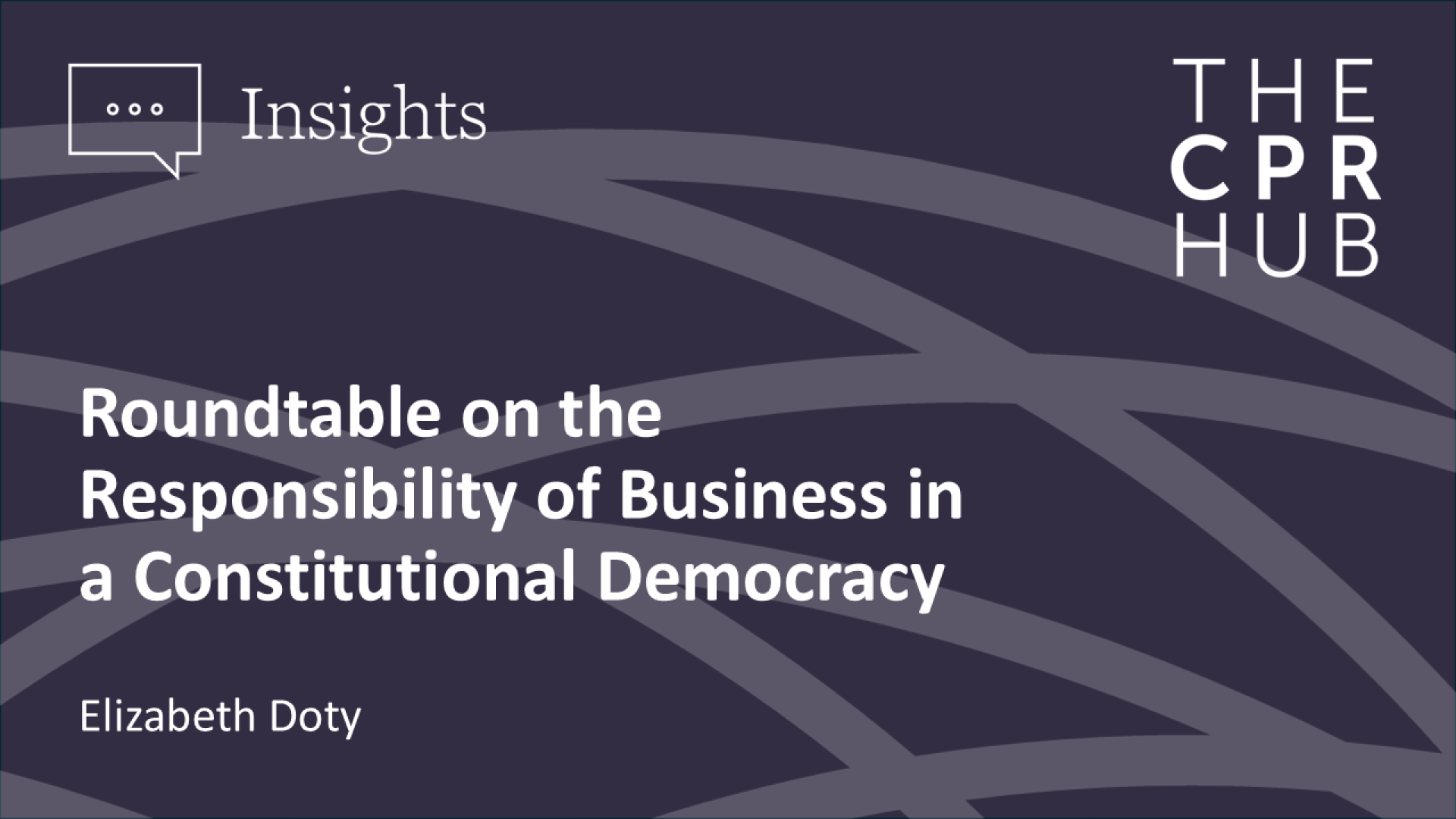Receive Updates from The CPR Hub
Learn about new tools, insights and events to help you consider how CPR can help your company, clients or members.



This article by the former President of the American Enterprise Institute explores the erosion of civic norms, institutional trust, and public-spirit in the United States, arguing that a decline in public honesty and civility is undermining free markets and trust in democratic institutions. It reflects how corporate actors operate in a context of systemic fragility and how their behaviors can either mitigate or exacerbate institutional decline. Rather than laws, he explains that it is the is the role of civic virtue which restrains advantage-taking by people who might otherwise derive special benefit from social, political, and legal systems.
This report examines the narrative “the system is rigged” and how it undermines trust in institutions, markets and businesses. It offers analysis of framing effects, public attitudes and communication strategies to help leaders rethink how they respond when stakeholders perceive business and government systems as unfair.
This report reveals a decline in trust, and how majorities now hold grievances against governments, business and the rich. Historically strong trust in “my employer” is complicated when employees hold grievances. Argues that business should respond in concert with other actors, investing in local communities, quality information, and job skills.
This policy brief outlines the challenges of AI implementation and dissemination through various sectors of society, and provides policy recommendations for how to protect privacy, safety and ethics as AI adoption grows.
This report highlights the growing bridge-building movement in the United States and provides concrete examples of organizations doing this work in different settings, including policymaking, workplaces, faith communities, education, and volunteering.
With his background as a former business executive leading companies such as e-Scholastic, the Proactiv Company and Guthy-Renker, Seth Radwell provides both historical context for the political division in the U.S., and a detailed plan on steps we can take to depolarize society.
Explores the history, emotion, and power of effective argumentation to promote more constructive debates and mutual learning in America. Shares key principles, including removing the focus on winning, prioritizing relationships and engaged listening, considering context, embracing vulnerability, and creating space for transformation.
This article is a summary of a conversation hosted by Democratic Innovations at Yale's ISPS. Led by ISPS Director Alan Gerber and ISPS faculty fellows and political science professors Hélène Landemore and Adam Meirowitz, Democratic Innovations serves as a laboratory to identify and test new ideas for improving the quality of democratic representation and governance. It recaps insihgts from the conversation hosted by Landemore and Theophile Penigaud de Mourgues, a postdoctoral associate with Democratic Innovations, and Jonathan Moskovic, advisor in democratic innovation for the president of the French-speaking Brussels Parliament.
To rebuild election trust among conservative voters, this Johns Hopkins–R Street tool outlines three actionable principles: affirm past election integrity, increase process transparency, and improve election operations. It pairs these with Gallup-backed data to guide civic leaders—including business—on addressing doubts without heightening polarization.
Convergence Compass is an online learning program for business, government, higher education and civic actors that teaches the psychology of division, dialogue strategies, and collaborative problem-solving. Developed from the Convergence Center for Policy Resolution's innovative methods, it equips participants to build trust, bridge divides, engage constructively on contentious issues, design effective processes —even when stakeholders hold strongly divergent views.
Paul Rosenburg interviews James Fishkin, the Janet M. Peck Chair in International Communication at Stanford University where he is Professor of Communication, Professor of Political Science (by courtesy) and Director of the Deliberative Democracy Lab. Fishkin recounts a wide range of real-world deliberation experiments—including on energy and climate—that achieved policy progress by integrating representative citizen groups, expert input, and structured facilitation. The interview outlines the design conditions for those breakthroughs, which can be a source of best practices for civil society organizations, and potentially, companies.
Resources for the Future's new series, If/Then, focuses on providing rapid, independent economic insights on the consequences of policy choices, drawing from both new and prior research. In a highly polarized environment, it aims to fill critical information gaps by making credible evidence accessible in real time to policymakers, businesses, and stakeholders navigating fast-moving debates.
This article urges companies to actively reduce the polarization that can impact their businesses, by carefully considering their public stances, promoting inclusivity, and fostering collaboration across differing viewpoints within their organizations and communities.
This textbook section introduces major corporate and agency public-relations subfunctions: issues management, media and community relations, CSR and philanthropy, investor relations, marketing communications, government relations, lobbying, internal communication, crisis management, and more. It shows how communication, advocacy, and stakeholder engagement are structured inside organizations, shaping how they respond to risks, opportunities, and public scrutiny.
This series offers a retrospective on how rising political spending—especially via dark money and super PACs—is shaping public perceptions, fueling polarization, and undermining trust. It highlights record-breaking ad spending across TV and digital platforms and calls for stronger disclosure and enforcement to protect democratic integrity.
This guide offers conversation practices and norms that help people move beyond political echo chambers, enabling genuine learning, mutual understanding, and connection across divides.
OpenSecrets is a nonpartisan, nonprofit transparency platform that tracks money in U.S. politics, compiling and analyzing campaign finance, lobbying, outside spending, and personal finance data for politicians. It offers searchable tools and educational resources that reveal how money flows around elections and policymaking, supporting evidence-based oversight by media, investors, employees, and the public.
This book shares the results of Diane Hessan's weekly interviews with 500 voters from every state, of every age and ethnicity, and along different points of the political spectrum. The topics ranged from race to guns, from character to party politics, from masks to rallies, from the Supreme Court to the pandemic to immigration and climate change. She finds that Americans have more common ground than they realize, but that they need new approaches to listening and understanding each other.
Summarizes the results of a two-year bipartisan commission studying citizen concerns and how to revitalize democratic participation. Calls for a “fourth founding” of the United States, outlining six imperatives: achieve equal representation, empower voters, ensure political responsiveness, expand civil society, build civic information systems, and nurture a culture of commitment to democracy.
This interactive database tracks corporate and individual contributions to 527 political organizations, offering transparency into issue-advocacy groups, political committees, and their funders. It enables stakeholders to analyze donation patterns, compare companies, and evaluate alignment between stated values, lobbying positions, and political spending, supporting stronger governance and oversight of political influence.
Housed in Duke’s Fuqua School of Business, is an initiative to explore the role business can play to reduce polarization and improve civic dialogue. Their website offers research and data on dialogue and engagement, showcases corporate initiatives that build common purpose, features news and business leaders’ perspectives, and hosts events to equip current and future leaders to navigate polarization and foster constructive conversations.
The Grand Bargain Project finds that Americans across party lines identify the same six priorities—economic opportunity, education, healthcare, national debt, clean energy, and tax reform—as critical, with surveys showing over 90% agreement on their importance. Even more encouraging, when comparing the status quo to a shared package of 35 reforms, 77% preferred the reforms. These results point to rare cross-partisan convergence on both the problems and potential solutions, and a possible place for constructive engagement.
This report based on extensive empirical research shows that, while political extremes dominate public discourse, most Americans belong to an “Exhausted Majority” who feel overlooked and frustrated by polarization. It underscores the need to elevate voices that champion trust, empathy, and shared values.
Data analysis shows that voters labeled as moderates, independents, or undecided hold diverse and often conflicting views, undermining the idea of a unified “moderate middle” in today’s polarized political landscape.
This piece analyses how social-media platforms and large communication networks increasingly moderate speech, respond to regulatory pressure and curate “compliant speech” to avoid legal/regulatory risk. It explores how the corporate/platform model of content moderation intersects with free-speech norms, public trust and corporate reputational responsibilities in a digitally mediated public sphere.
This continuing education online course by The Laboratory for the American Conversation is designed to help you understand how to have contentious conversations that don't escalate into the culture wars that have become all too common. You can apply this in your workplace and with family and friends.
Allstate’s 2025 research finds that trust in America is at a tipping point. While only 41% of Americans trust people across the U.S., the majority remain optimistic about their communities. The report emphasizes that rebuilding trust starts locally through engagement, leadership, and connection, and offers a three-part strategy: fostering interpersonal trust, investing in community leadership, and scaling trust-building efforts to strengthen democracy and economic resilience
Interviews with 48 Americans from across ideological and demographic groups reveal broad commonality in wanting fairness and clear expectations of government—such as equal rule enforcement, responsive leadership, transparent decision-making, and dignified public services. At the same time, people diverge on what constitutes fairness, with some emphasizing opportunity, others consistent process, and others tangible outcomes that prove fairness is real. Provides a starting point for stakeholder engagement, and suggests approaches that speak to concerns across the political spectrum.
This nonpartisan initiative aims to translate publicly available government data into clear, accessible insights on a variety of topics, including the economy, health, education, and government spending. By presenting information without spin, it aims to empower citizens, policymakers, and businesses to form their own conclusions, supporting the “third side” in polarized debates.
Explores how citizens' assemblies—randomly selected groups with active facilitation deliberating on policy—could improve U.S. democratic decision-making, improve trust and reduce polarization. Shares a successful initiative in Oregon to address youth homelessness.
This guidance helps leaders decide when to engage—or refrain—from responding to controversial social and political issues at work. It offers a framework for assessing relevance, risk, and responsibility, emphasizing the importance of consistency, listening, and clarity to avoid internal polarization while maintaining trust and organizational cohesion.
Emerging student groups at UC Berkeley are creating spaces fostering respectful connection across political divides by promoting civil discourse, hosting open debates, and offering courses that equip students with skills to engage diverse perspectives—grounded in the belief that seeking knowledge is the primary mission.
Learn about new tools, insights and events to help you consider how CPR can help your company, clients or members.
